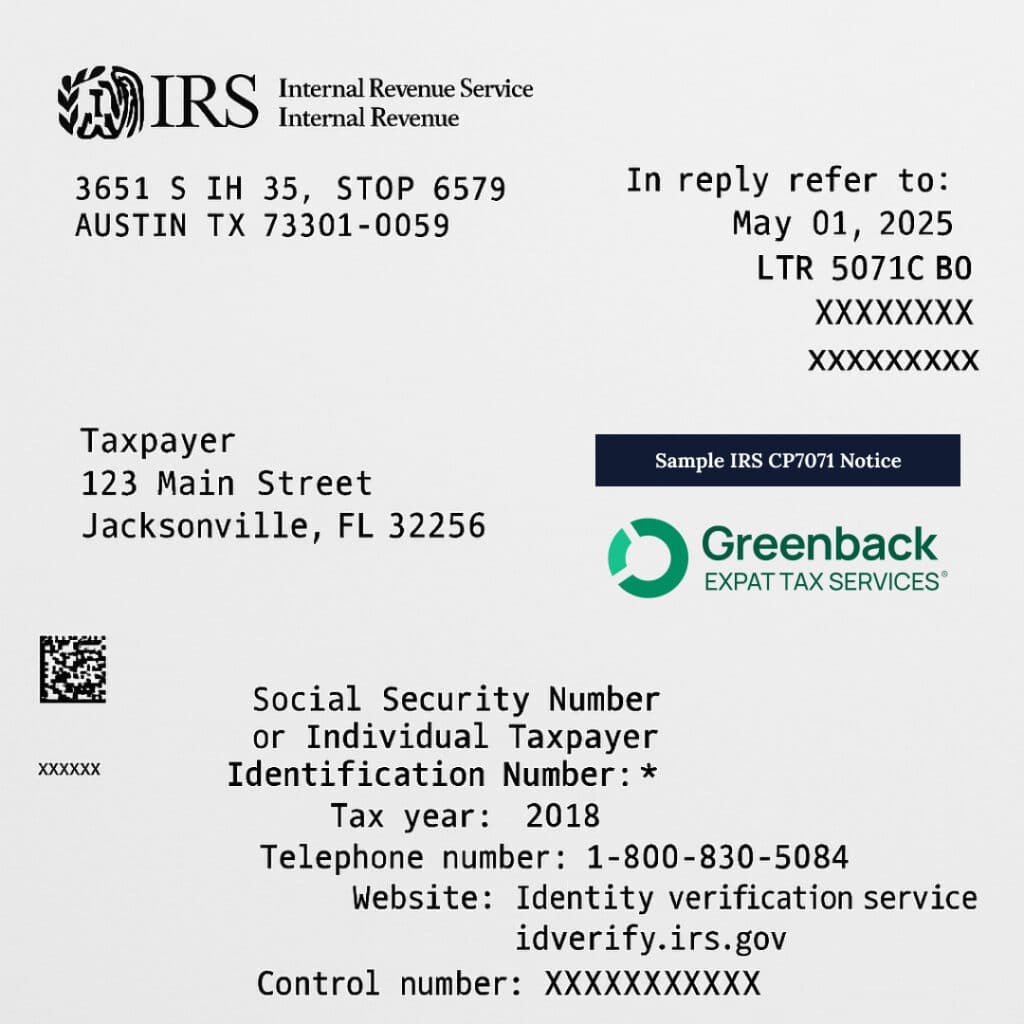IRS CP5071 Letters for Expats: Why You Got One and What to Do Next

Did you get a CP5071 letter in the mail this tax season? Data shows more and more U.S. taxpayers, especially expats, are being asked to verify their identity before the IRS processes their return. While the IRS doesn’t publish how many of these notices they send, search interest in “IRS notice CP5071” hit an all-time high in May 2025—more than double any point in the last five years.
If you’ve been flagged, don’t panic. This guide will explain what the CP5071 notice means, why you might have received it, and how to resolve it quickly, even if you live overseas.
What is a CP5071 Notice?
The CP5071 notice (or CP5071C/CP5071F) is a letter from the IRS asking you to confirm your identity before they finish processing your tax return or send a refund. It means the IRS got a return with your information, but they want to be sure it’s really you who filed it.
Good news: This doesn’t mean you’ve done anything wrong or that you’re a victim of identity theft. It’s part of the IRS’s fraud prevention system.
What it looks like:
- Arrives by mail
- Includes your name, taxpayer info, and instructions
- Has a 14-digit control number you’ll need to verify your identity
CP5071 notices are different from others like CP501 (a payment reminder) or CP71 (about installment plans). CP5071 is only about identity verification.

CP5071 vs. 5071C: What’s the Difference?
- 5071C is the most common version of the notice currently issued by the IRS.
- It asks the taxpayer to verify their identity online or by phone.
- It provides a URL to the IRS Identity Verification Service.
- CP5071 (often used as an umbrella term) may refer broadly to the type of notice or be used interchangeably in informal contexts, but the actual IRS-issued notice is labeled 5071C (or 5071F, less commonly).
Are More Expats Getting CP5071 Notices in 2025?
If you’ve received this notice, you’re not alone. We’re seeing a sharp rise in CP5071 letters sent to U.S. expats this year. Here’s why:
- Filing from abroad: Submitting your return from a foreign IP address or using an overseas mailing address can trigger a flag in the IRS system.
- Stricter fraud detection tools: The IRS is using smarter tech to catch suspicious activity. Expats often file in ways that look “unusual” to these systems.
- More scrutiny on international returns: With greater focus on FATCA and foreign account reporting, expat returns are under the microscope.
- Complicated returns = more flags: Expat taxes often involve multiple forms, foreign income, and credits. That complexity increases the chances of a return being flagged for review.
- First-time filers or major changes: If it’s your first time filing as an expat, or your return looks very different from last year, you’re more likely to get a CP5071 notice.
What to Do If You Get an IRS CP5071 Notice
If you’ve received a CP5071 letter (or a scanned copy from your mail service), don’t panic—but don’t ignore it either. The IRS won’t finish processing your return or issue any refund until you verify your identity.
Here’s what to do:
1. Verify the Notice
Genuine CP5071 notices are mailed by the IRS. They include a 14-digit control number and direct you to an official website ending in “.gov” or a specific IRS phone number.
2. Respond Within 30 Days
A timely response is critical. Delays can hold up your return or lead to more complications.
3. Choose a Verification Method
- Option A: Online (Best for Expats)
Go to the IRS Identity Verification Service (link in your notice). You’ll need:- Your 14-digit control number
- A government-issued photo ID
- Your most recent tax return
- An IRS or ID.me account
- Option B: By phone
Call the Taxpayer Protection Program number listed in your notice. Have all your documents ready, and be aware of time zone differences and international call costs.
4. If You Didn’t File the Return
Contact the IRS immediately. This may be a sign of identity theft. Do not submit Form 14039 unless instructed by the IRS.
5. Monitor Your Refund
After verification, the IRS may take up to 9 weeks to process your return. Use the “Where’s My Refund?” tool or the IRS2Go app to check your refund status.
Is a CP5071 Notice Bad News?
Not at all. It’s not an audit. It doesn’t mean you did anything wrong. This is just the IRS trying to protect you from identity theft and make sure it’s really you filing your return.
Special Challenges for Expats Responding to CP5071 Notices
Handling a CP5071 notice is already stressful, but for expats, it comes with extra hurdles:
- Mail delays: International mail can take weeks. By the time you get the letter, part of your 30-day response window may be gone.
- Online verification issues: ID.me and IRS systems sometimes have trouble with foreign IP addresses or non-U.S. IDs, which can block or delay online verification.
- Time zone headaches: IRS phone lines follow U.S. business hours, which might mean middle-of-the-night calls for you.
- International call costs: If you can’t verify online, phone verification can get pricey when calling from abroad.
- Hard-to-reach tax records: You may not have easy access to prior-year returns or financial info, which you’ll need to complete the verification process.
IRS Notice CP5071 and Scams: How to Stay Safe
Scammers love to mimic IRS notices, and CP5071 letters are no exception. Here’s how to tell what’s real and what’s not.
How to Recognize a Real CP5071 Notice
- Sent only by mail—never email, text, or call
- Directs you to irs.gov (or another “.gov” domain)
- Lists an IRS-issued phone number
- Never threatens arrest or demands immediate action
Watch Out for These CP5071 Scams
- Phishing emails or texts with fake IRS links
- Calls from someone claiming to be the IRS when you never received a letter
- Requests for payment or banking info
- Websites that look official but don’t end in .gov
How to Protect Yourself:
- Only trust irs.gov and the phone number on your mailed notice
- Ignore unsolicited messages about IRS identity verification
- Never share financial info by email or phone unless you initiated the contact
- Report scams to: [email protected]
Scam vs. Legit CP5071 Comparison
| Feature | Genuine IRS CP5071 Notice | Potential Scam Attempt |
| Delivery method | Mailed letter only | Email, text, phone call |
| Website | IRS.gov only | Fake/typo URLs, non-.gov sites |
| Payment request | Official IRS online portal, IRS phone number from the letter | May demand immediate payment |
| Threats/demands | None | Threats of arrest, legal action |
| How to respond | Official IRS online portal, IRS phone number from letter | Reply to email, click suspicious link |
How Greenback Can Help
Getting a CP5071 notice while living abroad can be stressful, but you don’t have to handle it alone. Our expat tax experts are here to help:
- Walk you through the process: We’ll explain exactly what the IRS needs, what documents to gather, and how to respond.
- Spot the cause: We’ll review your return to help figure out what triggered the notice—and how to fix any issues.
- Speak to the IRS for you: Our CPAs and Enrolled Agents can deal directly with the IRS, saving you time (and sleep, thanks to time zones).
- Reduce your risk next year: We’ll help you file clean, complete returns that are less likely to get flagged again.
How to Avoid CP5071 Notices in the Future
Want to lower the odds of facing this again next tax season? Here’s what we recommend:
Get an IRS Identity Protection PIN (IP PIN)
The single most effective way to prevent tax identity theft is to obtain an Identity Protection PIN from the IRS. This six-digit number adds an extra layer of security to your tax return by ensuring only you can file a return with your Social Security Number.
Other Preventative Measures
- File on time
- Double-check for accuracy
- Keep consistent info year to year
- Save clear records of foreign income and accounts
- Work with an expat tax specialist who knows how to avoid red flags
Related Article: U.S. Expat Taxes: Guide to Filing in 2025
How Long Does the CP5071 Process Take?
The timeline can vary, but here’s what to expect:
- Identity verification: If you verify online, it may take just a few minutes.
Phone verification or any issues can be extended to several days or weeks. - Return processing: Once verified, the IRS may take up to 9 weeks to process your return.
- Refunds: If you’re owed a refund, it will be issued after processing. The good news? The IRS often adds interest for the delay.
Heads-up: During peak tax season or for complex returns, things may take longer than 9 weeks.
Use the “Where’s My Refund?” tool or IRS2Go to track your status.
What to Do Next
Got a CP5071 notice?
Let our expat tax experts walk you through it—step by step.
Already verified?
We can help you file smarter next year to reduce the chances of being flagged again.
Schedule your consultation today and take the stress out of tax season.
Frequently Asked Questions About CP5071 Notices
What is the difference between CP5071, CP5071C, and CP5071F notices?
They’re all versions of the same identity verification notice. The letters “C” or “F” just refer to small differences in formatting or delivery. The purpose is the same: the IRS wants to confirm it’s really you who filed the return.
Can I verify my identity for the IRS online?
Yes, most people can. The IRS’s online Identity Verification Service is usually the fastest and easiest option, especially for expats.
You’ll need:
- Your CP5071 notice
- A government-issued photo ID
- A copy of your most recent tax return
What triggers a CP5071 letter from the IRS?
Several things can set it off, including:
- Filing from a foreign IP address or mailing address
- Filing as an expat for the first time
- Big changes from previous years (income, credits, deductions)
- Typos or mismatched info
- Random selection as part of IRS fraud checks
How long does it take to get my refund after verifying my identity?
It can take up to 9 weeks after successful identity verification to process your return. If you’re owed a refund, it will usually come shortly after that, with interest for the delay.
What if I can’t verify my identity online?
You can:
- Call the IRS using the number on your notice
- If that doesn’t work, you might need to verify in person at a Taxpayer Assistance Center
Need Assistance?
If you’re unsure about the verification process or need help, consider reaching out to a tax professional service like Greenback Expat Tax Services, which is experienced in handling IRS identity verification issues. We can guide you through the steps and help resolve your tax matters efficiently.
Receiving a CP5071 notice can be concerning, but it’s a crucial step in protecting your identity and ensuring the accuracy of your tax records. Prompt action will help minimize delays in receiving your tax refund.
Have questions about the process or next steps? Contact us, and one of our Customer Champions will happily address all your concerns.
Get the Free Download That Makes Filing Taxes Simple
"*" indicates required fields



